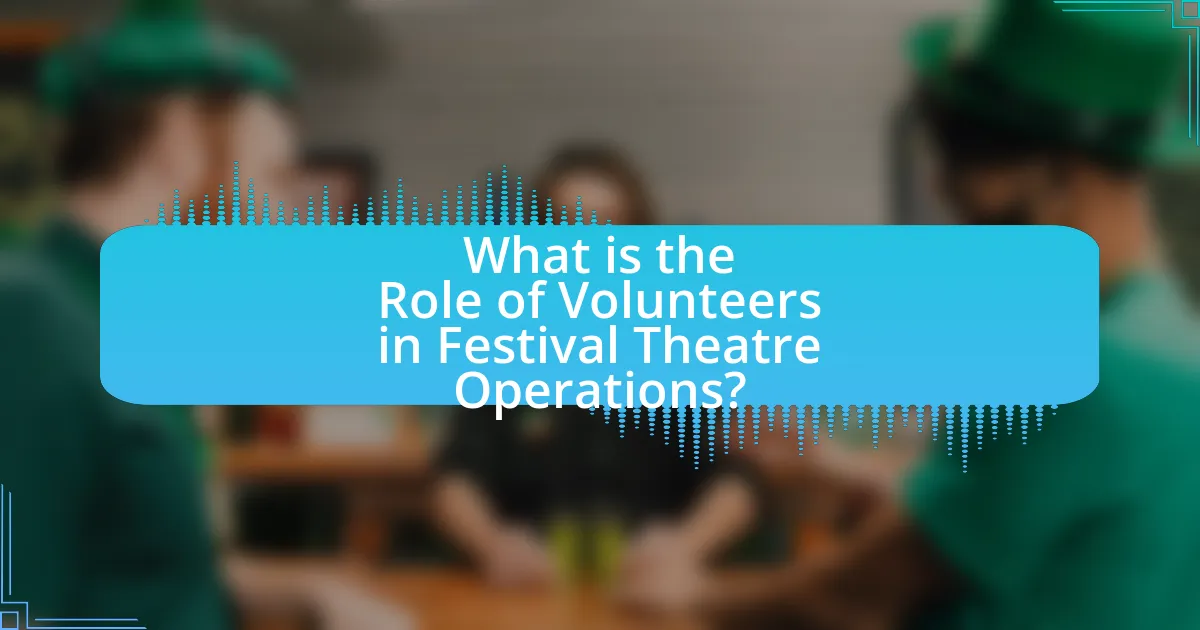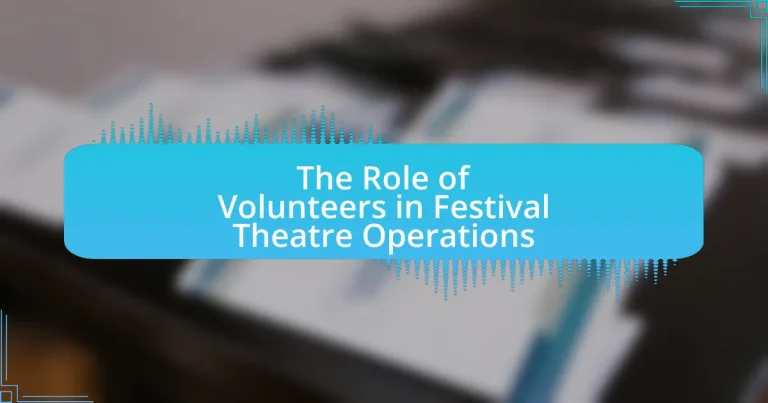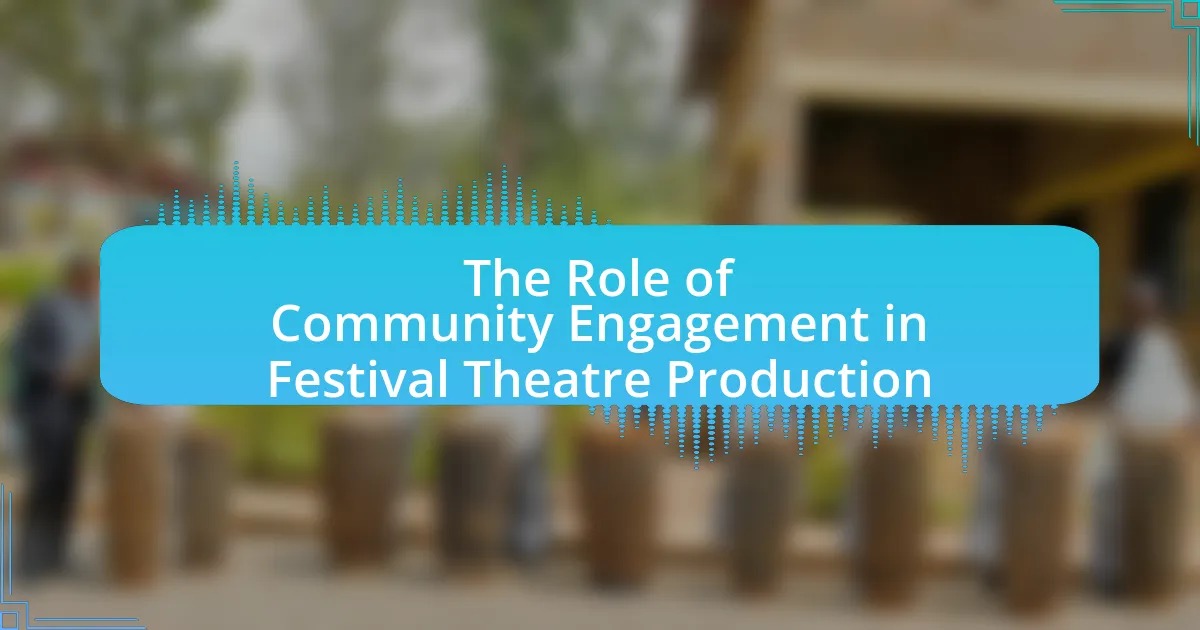Volunteers are integral to festival theatre operations, providing essential support in roles such as ushering, ticketing, and event coordination. Their contributions not only enhance audience experiences but also significantly reduce operational costs, allowing festivals to allocate resources more effectively. The article explores the various tasks performed by volunteers, their impact on community engagement, and the skills they bring to the table. Additionally, it addresses the challenges volunteers face and offers best practices for recruitment, training, and recognition to improve volunteer satisfaction and retention. Overall, the role of volunteers is crucial for the sustainability and success of festival theatres.

What is the Role of Volunteers in Festival Theatre Operations?
Volunteers play a crucial role in festival theatre operations by providing essential support in various capacities, including ushering, ticketing, and event coordination. Their involvement enhances the overall experience for attendees and helps ensure that the festival runs smoothly. For instance, a study by the National Endowment for the Arts highlights that volunteer engagement can significantly reduce operational costs and improve audience satisfaction, demonstrating the tangible benefits of their contributions.
How do volunteers contribute to the success of festival theatre?
Volunteers significantly contribute to the success of festival theatre by providing essential support in various operational roles. They assist with tasks such as ticket sales, ushering, and event setup, which are crucial for the smooth execution of performances. According to a study by the National Endowment for the Arts, volunteer involvement can enhance audience engagement and foster community connections, leading to increased attendance and overall festival success. Their dedication not only helps reduce operational costs but also enriches the festival experience for both attendees and performers, creating a vibrant cultural atmosphere.
What specific tasks do volunteers perform during festival operations?
Volunteers perform various specific tasks during festival operations, including ticket sales, crowd management, and assisting with event setup and breakdown. These roles are essential for ensuring smooth operations and enhancing the overall festival experience. For instance, volunteers often manage entry points, distribute programs, and provide information to attendees, which contributes to efficient crowd flow and visitor satisfaction. Additionally, they may assist in logistical tasks such as setting up stages, arranging seating, and managing vendor areas, which are critical for the successful execution of festival activities.
How do volunteers enhance the audience experience at festivals?
Volunteers enhance the audience experience at festivals by providing essential support services that improve overall event enjoyment. They assist with various tasks such as ticketing, information dissemination, and crowd management, which helps streamline operations and reduce wait times. For instance, a study by the National Endowment for the Arts found that well-organized volunteer programs can lead to a 20% increase in attendee satisfaction ratings. Additionally, volunteers often serve as ambassadors for the festival, sharing their enthusiasm and knowledge, which fosters a welcoming atmosphere and encourages audience engagement. Their presence not only alleviates staff workload but also creates a sense of community, making the festival experience more memorable for attendees.
Why are volunteers essential for festival theatre sustainability?
Volunteers are essential for festival theatre sustainability because they provide crucial support that reduces operational costs and enhances community engagement. Their involvement allows festivals to allocate limited financial resources more effectively, as volunteer labor can replace paid staff in various roles, from ticket sales to event setup. According to a study by the National Endowment for the Arts, volunteer contributions in arts organizations can account for significant savings, often equating to thousands of dollars in labor costs. This financial efficiency enables festival theatres to invest more in programming and outreach, fostering a sustainable model that benefits both the organization and the community it serves.
What impact do volunteers have on operational costs?
Volunteers significantly reduce operational costs for festival theatre operations by providing essential services without financial compensation. Their contributions can replace paid staff in various roles, such as ushering, ticketing, and event setup, which directly lowers labor expenses. For instance, a study by the National Council for Voluntary Organizations found that volunteer contributions can save organizations up to 75% on staffing costs, allowing funds to be reallocated to other critical areas like programming and marketing. This financial impact underscores the vital role volunteers play in enhancing the sustainability of festival theatre operations.
How do volunteers help in building community engagement?
Volunteers help in building community engagement by actively participating in local events and initiatives, fostering connections among residents. Their involvement in festival theatre operations, such as organizing performances and facilitating workshops, creates opportunities for community members to collaborate and interact. Research indicates that communities with high volunteer engagement report increased social cohesion and a stronger sense of belonging, as evidenced by a study from the Corporation for National and Community Service, which found that volunteering can lead to a 27% increase in community trust. This demonstrates that volunteers play a crucial role in enhancing community ties and promoting active participation in local culture.
What skills do volunteers bring to festival theatre operations?
Volunteers bring a diverse set of skills to festival theatre operations, including organizational abilities, customer service expertise, and teamwork. These skills enhance the efficiency and overall experience of the festival. For instance, volunteers often possess strong communication skills, which facilitate interactions with attendees and other staff, ensuring smooth operations. Additionally, many volunteers have experience in event planning or logistics, allowing them to effectively manage tasks such as setup, ticketing, and crowd control. Research indicates that volunteer involvement can significantly improve operational outcomes, as seen in various festivals where volunteer contributions led to increased attendee satisfaction and streamlined processes.
How do volunteers’ backgrounds influence their roles in festivals?
Volunteers’ backgrounds significantly influence their roles in festivals by determining their skills, experiences, and motivations. For instance, individuals with prior event management experience may take on leadership roles, while those with artistic backgrounds might contribute creatively, such as in set design or performance. Research indicates that volunteers with specific skill sets, such as technical expertise or customer service experience, are often assigned tasks that align with those abilities, enhancing overall festival operations. A study by the National Endowment for the Arts found that volunteers with relevant backgrounds are more likely to engage effectively, leading to improved festival outcomes and participant satisfaction.
What training do volunteers typically receive for festival operations?
Volunteers typically receive training that includes orientation on festival policies, safety procedures, and specific roles they will perform during the event. This training often covers customer service skills, communication techniques, and emergency response protocols to ensure a smooth operation. For instance, many festivals provide hands-on training sessions where volunteers can practice their tasks in a controlled environment, reinforcing their understanding of responsibilities and expectations.
How can festival theatres effectively recruit and retain volunteers?
Festival theatres can effectively recruit and retain volunteers by implementing targeted outreach strategies and fostering a supportive community environment. Targeted outreach includes utilizing social media platforms, local community boards, and partnerships with educational institutions to attract diverse volunteer candidates. Additionally, creating a welcoming atmosphere through orientation sessions and ongoing training helps volunteers feel valued and engaged.
Retention is enhanced by recognizing volunteer contributions through appreciation events, providing opportunities for skill development, and maintaining open communication channels for feedback. Research indicates that organizations with structured volunteer recognition programs see a 50% increase in volunteer retention rates. By combining these strategies, festival theatres can build a committed and enthusiastic volunteer base essential for their operations.
What strategies are most effective for attracting volunteers?
Effective strategies for attracting volunteers include creating a compelling mission, offering flexible opportunities, and utilizing social media for outreach. A clear and inspiring mission statement engages potential volunteers by highlighting the impact of their contributions. Flexibility in scheduling allows individuals to participate according to their availability, making volunteering more accessible. Research indicates that organizations using social media platforms to share stories and testimonials about volunteer experiences see a significant increase in interest; for instance, a study by the Corporation for National and Community Service found that 63% of volunteers learned about opportunities through social media. These strategies collectively enhance volunteer recruitment efforts in festival theatre operations.
How can festival theatres create a positive volunteer experience?
Festival theatres can create a positive volunteer experience by providing clear communication, structured training, and recognition of contributions. Clear communication ensures that volunteers understand their roles and responsibilities, which enhances their confidence and effectiveness. Structured training equips volunteers with the necessary skills and knowledge, leading to a more fulfilling experience. Recognition of contributions, such as through awards or public acknowledgment, fosters a sense of belonging and appreciation. Research indicates that organizations that implement these practices report higher volunteer satisfaction and retention rates, demonstrating the effectiveness of these strategies in enhancing the volunteer experience.
What challenges do volunteers face in festival theatre operations?
Volunteers in festival theatre operations face several challenges, including time constraints, lack of training, and coordination issues. Time constraints arise as volunteers often juggle their commitments with personal and professional responsibilities, limiting their availability. Lack of training can lead to confusion and inefficiency, as many volunteers may not have prior experience in theatre operations, which can affect the overall quality of the festival. Coordination issues stem from the need to manage diverse teams and schedules, making it difficult to ensure that all tasks are completed effectively and on time. These challenges can hinder the smooth execution of festival operations and impact the volunteer experience.
How can festival theatres support volunteers in overcoming these challenges?
Festival theatres can support volunteers in overcoming challenges by providing comprehensive training programs that equip them with necessary skills and knowledge. These training sessions can cover areas such as customer service, safety protocols, and technical operations, ensuring that volunteers feel confident and prepared. Additionally, festival theatres can implement mentorship systems where experienced volunteers guide newcomers, fostering a supportive community. Research indicates that structured support systems significantly enhance volunteer retention and satisfaction, as seen in studies conducted by the National Volunteer Organizations. By actively engaging volunteers through recognition initiatives and feedback mechanisms, festival theatres can further motivate and empower them, addressing challenges effectively.
What are common misconceptions about volunteering in theatre festivals?
Common misconceptions about volunteering in theatre festivals include the belief that volunteers only perform menial tasks and do not gain valuable experience. In reality, volunteers often engage in diverse roles that contribute significantly to festival operations, such as assisting with production, marketing, and audience engagement. A study by the National Endowment for the Arts found that 70% of volunteers reported acquiring new skills and networking opportunities through their involvement in arts festivals, demonstrating that volunteering can enhance personal and professional development.
What best practices can enhance volunteer involvement in festival theatre?
To enhance volunteer involvement in festival theatre, organizations should implement structured training programs that equip volunteers with necessary skills and knowledge. Structured training ensures that volunteers feel confident in their roles, which can lead to increased satisfaction and retention rates. Research indicates that organizations with comprehensive training programs experience a 50% higher volunteer retention rate compared to those without such initiatives. Additionally, fostering a sense of community through regular social events and recognition programs can significantly boost volunteer morale and engagement. Studies show that volunteers who feel appreciated are 70% more likely to return for future events.
How can feedback mechanisms improve volunteer engagement?
Feedback mechanisms can significantly improve volunteer engagement by providing structured opportunities for volunteers to express their thoughts and experiences. When volunteers receive regular feedback, they feel valued and recognized, which enhances their commitment to the organization. Research indicates that organizations implementing feedback systems report a 20% increase in volunteer retention rates, as volunteers are more likely to stay engaged when they see their input leading to tangible changes. Furthermore, feedback mechanisms foster a sense of community among volunteers, as they can share insights and collaborate on improvements, ultimately leading to a more motivated and cohesive volunteer team.
What role does recognition play in volunteer satisfaction?
Recognition significantly enhances volunteer satisfaction by validating their contributions and fostering a sense of belonging. When volunteers receive acknowledgment for their efforts, it boosts their morale and encourages continued engagement. Research indicates that 70% of volunteers report higher satisfaction levels when their work is recognized, as noted in a study by the Corporation for National and Community Service. This recognition not only reinforces their commitment but also cultivates a positive organizational culture, ultimately leading to increased retention rates among volunteers.

















